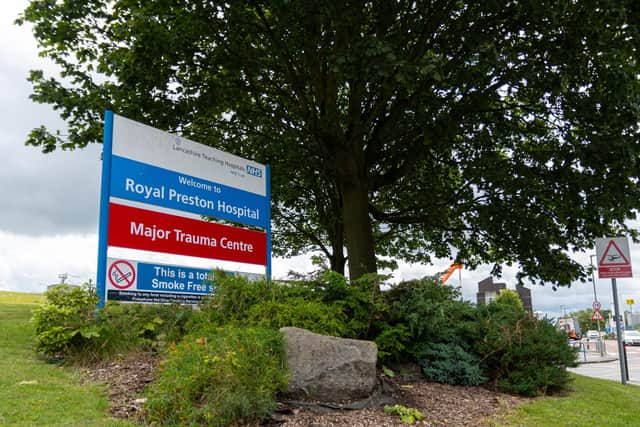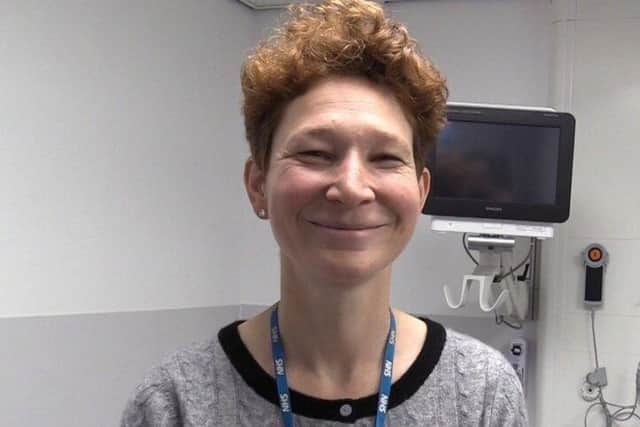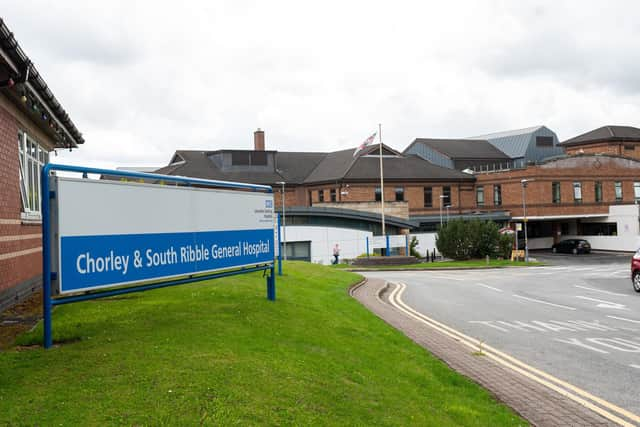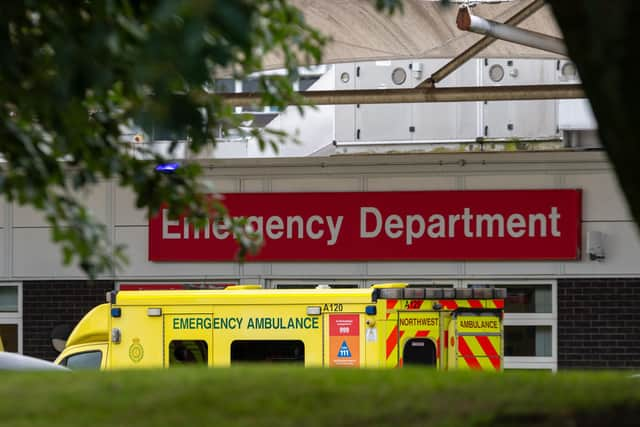Royal Preston and Chorley hospitals told to improve by Care Quality Commission - after nine-year run of getting the same message
and live on Freeview channel 276
It is the fifth consecutive occasion in nine years that Lancashire Teaching Hospitals NHS Foundation Trust (LTH) has been given the grading by the Care Quality Commission (CQC).
The hospitals’ interim chief executive, Faith Button, acknowledged that the outcome was disappointing, but told the Lancashire Post that it was “extremely difficult” to move up into the ‘good’ category against the backdrop of issues like the waiting list backlog caused by the pandemic and the pressure on urgent and emergency care services being felt nationwide - irrespective of the “great progress” that she said had been made in tackling both.
Advertisement
Hide AdAdvertisement
Hide AdThe 194-page report identifies 54 areas for improvement - 18 of which are must-dos that have to be addressed in order for the trust to “comply with its legal obligations”. These include ensuring that there are enough medical staff at the Royal Preston to keep patients safe; that staff across the trust complete mandatory training; and, in the urgent and emergency care departments at both sites, that private patient information is not visible to visitors to the department.


Throughout LTH, all staff were considered by inspectors to be “committed to improving the quality of care and patient experience” and were focused on the needs of those in their care.
The CQC did not assess all areas of the two sites during its unannounced inspection, which was carried out across 10 days over the summer - but it nevertheless came up with an overall rating for LTH, based on refreshed and previous scores, having this time inspected urgent and emergency care at both Preston and Chorley, in addition to medical care and surgery at Preston.
A focused inspection of the maternity units was also undertaken as part of CQC’s national maternity services programme.
Advertisement
Hide AdAdvertisement
Hide AdWithin LTH's overarching ‘requires improvement’ grade, the same mark was given to the trust’s ‘safe’, ‘effective’, ‘responsive’ and ‘well-led’ domains, with the latter dropping down from good since the last wholesale inspection in 2019. However, the organisation was once again rated good in the ‘caring’ category.


The two individual hospitals were also found to require improvement - a deterioration for the Chorley facility compared to 2019 and the same fate as suffered within the ‘safe’ domain for its urgent and emergency care and maternity services, both of which remain good overall.
At the Royal Preston, urgent and emergency care was found to require improvement overall, a repeat of its 2019 score, with concerns raised including that the design of the department made it “difficult to keep people safe” and that staff “did not always assess risks to patients, act on them or keep care records updated”.
However, staff at the Fulwood site’s A&E facilities “provided good care and treatment”, administered pain relief when patients needed it and treated people “with compassion and kindness, respected their privacy and dignity and helped them understand their conditions”. They were also found to provide emotional support to patients, families and carers.
Advertisement
Hide AdAdvertisement
Hide AdThe overall rating for maternity services at the Royal Preston fell from good to requires improvement, with reasons listed in the report including “long delays in the induction of labour” for some women,


compliance with life support training being below trust targets and the fact that “not all staff felt that [they] were listened to by senior leaders when highlighting concerns around staffing".
Maternity unit staff at Preston, however, “worked well together for the benefit of women and birthing people, understood how to protect women and birthing people from abuse and managed safety well”.
Meanwhile, surgery at the Royal Preston remained rated ‘good’, although within that, it had fallen to requires improvement on the ‘responsive’ measure.
Advertisement
Hide AdAdvertisement
Hide AdMedical care was still deemed to require improvement, as in 2019, but its ‘well-led' metric had improved to good.


Faith Button, who is usually LTH’s chief operating officer, but is covering the chief executive role until early next year, when Silas Nicholls arrives from the neighbouring Wrightington, Wigan and Leigh trust, told the Post: “For our local population of patients, there is nothing in [the CQC] report that anyone should be concerned about.
“You will be looked after well and treated well at the hospitals - we have really good clinical expertise here.
“But we want to get to ‘good’ - we have got to note what [the inspectors] say and we have got to go through that line by line.
Advertisement
Hide AdAdvertisement
Hide Ad“After our last inspection [in 2019], we were a whisker away from being good and the CQC fed that back to us - there were just a couple of areas we were working on to improve. Obviously, [we then had] the pandemic and the pressure we were under post-pandemic - this year, particularly, [with] the elective backlog, industrial action, pressure on our finances and the emergency front door.
“But we have got a plan: integrating with our community services more, virtual wards [and] the care connection hub - rapid response teams who are able to come out to patients instead of [them] being [brought] to hospital.
“That is the way for acute trusts to try and stem some of the admissions coming into hospital and get the [patient] flow better, so that we can then get to the good which the CQC expect. So there are plans in place,” Ms. Button said.
IN NUMBERS
***7 out of 17 domains inspected at the Royal Preston maintained a good rating.
***5 areas remain as requires improvement.
***3 domains went from good to requires improvement
***2 areas improved from requires improvement to good.
Advertisement
Hide AdAdvertisement
Hide Ad***5 out of 7 domains inspected at Chorley Hospital maintained a good rating.
*** 2 areas went from good to requires improvement.
WHY ARE WE WAITING?
The CQC report noted that LTH had “significant challenges” regarding so-called “elective recovery” - reducing the waiting lists for pre-planned operations in the wake of Covid - and also performance against cancer treatment targets. It said that the trust was in the lowest 25 percent nationally on those measures.
However, Faith Button said that the organisation was working through the backlog and had hit the phased targets set by NHS England for the eradication of waits of two years and, later, 78 weeks.
“We’ve cleared over 20,000 people… and we’ve got another 9,000 to get through between now and March to get to [the next] 65-week [target],” she explained.
Advertisement
Hide AdAdvertisement
Hide AdAccording to the latest NHS figures, 3,991 patients had been waiting more than 52 weeks for treatment or an appointment at LTH in September.
INNOVATION STATIONS
LTH said that it received more recognition for outstanding practice within the latest CQC report than in any one that preceded it.
The achievements highlighted included a programme that had resulted in a 42 percent reduction in ambulance handover times at A&E between December 2022 to March 2023 - from 40.4 to 23.3 minutes.
Also commended was the opening of the Finney House intermediate care facility in Preston last year, designed to reduce the number of people stuck in hospital when they were medically fit to leave - and which had seen a reduction in the proportion of such patients on the wards from 12 percent to just over five percent.
Advertisement
Hide AdAdvertisement
Hide AdAn initiative to encourage awareness of birth choices also received special mention.
STAFF SATISFACTION
According to the CQC report, most staff at LTH “felt respected, supported and valued”. The service was found to have “an open culture where patients, their families and staff could raise concerns without fear”.
However, it was noted that staff working in those areas under the greatest pressure - specifically due to patient demand, financial constraints and challenges recruiting medical staff - “felt less supported by the senior leadership”, in an echo of comments made during the 2019 inspection.
They were nevertheless positive about their departments and local leadership teams, whom they said they were able to speak to “about difficult issues when things went wrong”.
Advertisement
Hide AdAdvertisement
Hide AdFINANCIALLY FIT?
Inspectors noted that the board has signed off a cost saving target of £67m - but “without a plan detailing how this would be achieved”. It had also accepted a so-called “stretch target” from the Lancashire and South Cumbria Integrated Care System, but at the time of the inspection, there was little evidence of any schemes to deliver it, representing “a significant risk” to the trust’s financial plan.
However, it was acknowledged that the trust had successfully delivered its cost savings programmes in the past and that a financial strategy and action plan had been in place since 2021.
54 WAYS TO IMPROVE
According to the CQC, these are the 18 actions the trust must take to comply with its legal obligations:
Trust-wide
• The trust must ensure staff complete mandatory training in accordance with the relevant schedule and receive sufficient training, supervision, and appraisal to perform their duties competently.
Royal Preston Hospital
Urgent and Emergency Care
Advertisement
Hide AdAdvertisement
Hide Ad• The trust must ensure that medical staff complete all required mandatory training.
• The trust must ensure that risk assessments are fully completed for patients attending with mental health needs and mitigating actions to limit identified risks are implemented.
• The service must ensure that staff complete patient records accurately and in a timely manner.
• The trust must ensure that patient-identifiable information is not visible to visitors to the department
Medical Care
Advertisement
Hide AdAdvertisement
Hide Ad• The service must ensure patients receive antimicrobials in line with the national guidelines.
• The service must improve compliance for resuscitation training for medical and nursing staff and compliance for sepsis training for medical staff.
• The service must ensure that patient records are kept secure.
• The service must ensure they have enough medical staff to keep patients safe.
Surgery
Advertisement
Hide AdAdvertisement
Hide Ad• The trust must continue to take actions to improve referral to treatment waiting time performance in line with national standards.
• The trust must continue to take actions to improve the number of patients receiving a clinical assessment and daily review by a senior decision maker within target timescales.
Maternity
• The service must ensure staff receive such appropriate training as is necessary to enable them to carry out the duties they are employed to perform. This includes but is not limited to life support and pool evacuation training.
Chorley and South Ribble Hospital
Urgent and Emergency Care
• The trust must ensure that all staff, including medical staff, complete mandatory training requirements.
Advertisement
Hide AdAdvertisement
Hide Ad• The trust must ensure that checks of consumables are completed including integrity of packaging and within expiry dates.
• The trust must ensure that patient identifiable information is not visible to visitors to the department.
• The trust must ensure patients with a mental health concern are cared for in a room that is free from objects that could be used to self-harm.
Maternity
• The service must ensure staff receive such appropriate training as is necessary to enable them to carry out the duties they are employed to perform. This includes but is not limited to life support and pool evacuation training.
Advertisement
Hide AdAdvertisement
Hide Ad• The service must ensure equipment is secure, suitable for the purpose for which it is being used and properly maintained. This includes but is not limited to emergency equipment and firefighting equipment.
According to the CQC, these are the 36 actions the trust should take, because it is not doing something required by a regulation - although it would be disproportionate to find a breach of the regulation overall:
Trust-wide
• The trust should ensure that it continues to monitor pharmacy staffing to support continued improvement in medicines optimisation.
• The trust should monitor the administration of files for the fit and proper persons checks.
Royal Preston Hospital
Emergency Urgent and Emergency Care
Advertisement
Hide AdAdvertisement
Hide Ad• The service should ensure that patient-identifiable details are not displayed on public boards.
• The service should continue its focus on establishing sufficient numbers of medical staff and managing any risks occurring as a result of staffing lack in medical workforce.
• The service should continue its focus on improving local audit (STAR accreditation) outcomes.
• The service should ensure that patients’ nutrition and hydration needs continue to be regularly monitored whilst they are waiting for treatment and care.
Medical Care
Advertisement
Hide AdAdvertisement
Hide Ad• The trust should ensure patients receive daily, timely review when not being provided care and treatment on the correct medical speciality ward.
• The service should ensure that staff follow infection prevention control principles.
• The service should ensure that premises are safe to use for patients.
• The service should ensure risk assessments, care plans and intentional rounding is completed regularly for all patients.
Advertisement
Hide AdAdvertisement
Hide Ad• The service should continue to monitor the correct recording of NEWS2 observations.
• The service should ensure that equipment is properly maintained, including the patient call bells and showering facilities.
• The service should ensure that complaints are managed in a timely manner.
• The service should continue to improve waiting times for patients accessing neurology cancer treatment.
Advertisement
Hide AdAdvertisement
Hide Ad• The service should improve staff attendance at governance meetings.
• The trust should continue to improve the provision of single sex washing facilities for patients.
• The trust should continue to recruit allied health professions within medical care.
• The trust should monitor and review arrangements to ensure that medicines with a minimum dosage interval are administered as prescribed.
Advertisement
Hide AdAdvertisement
Hide Ad• The trust should continue to use medicines data to support improvement in medicines safety.
Surgery
• The trust should monitor and review arrangements to ensure that medicines with a minimum dosage interval are administered as prescribed.
• The trust should continue to use medicines data and keep pharmacy staffing under review to support continued improvement in medicines safety, including medicines reconciliation.
• The service should consider how wards and theatre areas can be made more dementia friendly.
Maternity
Advertisement
Hide AdAdvertisement
Hide Ad• The service should ensure the maternity assessment service has the right number of qualified staff and the triage telephone line is answered and monitored by a trained midwife.
• The service should improve the culture where staff feel listened to.
• The service should ensure they monitor delays in the induction of labour process and all reasons for the delays are documented.
• The service should ensure there is an accurate overview of risks faced, including the monitoring of delays in induction of labour, monitoring of missed telephone calls and telephone call drop off rates within triage and to rate all 3rd and 4th degree tears and post-partum haemorrhages as incidents.
Chorley and South Ribble Hospital
Urgent and Emergency Care
Advertisement
Hide AdAdvertisement
Hide Ad• The trust should ensure that all conversations with patients, and their families take place in an environment where they are not overheard,
• The trust should ensure that all noticeboards include current information such as safeguarding.
• The trust should ensure that all patients with protected characteristics are supported such as availability of information in formats that patients understand.
• The trust should ensure that complaints are managed in a timely manner
Advertisement
Hide AdAdvertisement
Hide Ad• The trust should consider including checks of the transfer bag with other daily checks.
• The trust should consider locating paediatric emergency information where children would be treated.
• The trust should consider reviewing the environment where paediatrics are treated to be more child friendly.
• The trust should consider sourcing comfortable chairs appropriate for patients with additional needs such as mobility or bariatric.
Maternity
Advertisement
Hide AdAdvertisement
Hide Ad• The service should review use of patient group directions and storage of aromatherapy oils to assure themselves medicines management is in line with best practice.
• The service should ensure staff carry out newborn observations using track and trigger system in a timely way in line with local guidance.
‘MORE TO DO’
Commenting on the inspection findings, Sheila Grant, the CQC’s deputy director of operations in the north, said:
"When we visited Lancashire Teaching Hospitals NHS Foundation Trust, we found leaders showed adequate experience, knowledge and skills to be able to run the trust. However, some staff felt leaders weren’t always visible in services where there were greater pressures, which left some staff feeling unsupported.
Advertisement
Hide AdAdvertisement
Hide Ad“Inspectors found the trust had processes in place to escalate relevant risks and identified actions to reduce their impact. However, in urgent and emergency care, there were concerns about the management of people with mental health needs. We raised this with the trust, who responded quickly to our concerns.
“At Royal Preston Hospital, there were delays in induction of labour, with no explanation in people’s notes of why this delay happened for over half the people we looked at. The service has now introduced a new system to reduce the delays and improve the standard of care for women and people using the service.
“We also found some outstanding practice in both maternity services, as well as in the emergency department at Royal Preston Hospital.
“Additionally, last November, the trust opened Finney House (a step-down rehabilitation centre). This is for people who no longer meet the criteria to be in an acute hospital but require support such as rehabilitation before returning into the community. This has reduced the number of people who don’t meet the criteria for being in an acute hospital.
Advertisement
Hide AdAdvertisement
Hide Ad“Following these inspections, we reported our findings to the trust. Its leaders know where they need to make improvements.
“We will continue to monitor the trust and will return to carry out another inspection, to ensure the necessary improvements have been made so people receive the safe care they deserve,” Ms. Grant added.
In a statement responding to the report, LTH chair Peter White said: “As a health system in Lancashire and South Cumbria, we have an ambition for all providers to be rated as good overall by the CQC. This means that as a trust we need to continue on our journey
towards providing good and ultimately outstanding services at both Royal Preston and Chorley and South Ribble Hospitals.
Advertisement
Hide AdAdvertisement
Hide Ad“There is still more work to do to ensure they are truly great places to be cared for and to work in, but I firmly believe that we have strong plans in place and the right teams to deliver them.”
Faith Button added: “Our patients and staff remain at the heart of all that we do, so I am very pleased that, despite the challenges we face, we continue to be rated good for caring across our hospitals and that the majority of staff feel valued, supported and respected.
“As a trust, we recognise the improvements that we need to make and will continue to work with our leaders, their teams and system partners to ensure standards of services are met and to involve our wider stakeholders in our decision making so that we continue to improve and shape services together.
“We are pleased that the CQC recognises the good and outstanding work of our teams as well as identifying where we need to make improvements. I know that our teams are dedicated to continuing to work hard to keep improving our services to be the best they can be for their patients, colleagues and our local communities.”